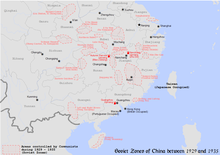Longzhou Uprising
| Longzhou Uprising | |||||||
|---|---|---|---|---|---|---|---|
| Part of Chinese Civil War | |||||||
 The Longzhou Uprising, labelled as the "Left River" Uprising | |||||||
| |||||||
| Belligerents | |||||||
|
|
| ||||||
| Commanders and leaders | |||||||
 Li Zongren Li Zongren |  Yu Zuoyu Yu Zuoyu Li Mingrui Li Mingrui Deng Xiaoping Deng Xiaoping | ||||||
| Longzhou Uprising | |||||||
|---|---|---|---|---|---|---|---|
| Traditional Chinese | 龍州起義 | ||||||
| Simplified Chinese | 龙州起义 | ||||||
| |||||||
The Longzhou Uprising was an armed Chinese Communist Party uprising during the early years of the Chinese Civil War that took place in Longzhou County, Guangxi. Following on the heels of the Baise Uprising that had created the You River Soviet to its north, the uprising began on 2 February 1930, and established the Zuo River Soviet in eight counties of southwest Guangxi. It was led by the Guangxi Front Committee of the Chinese Communist Party (CCP), including Li Mingrui and Deng Xiaoping. Its military forces were organized into the Eighth Red Army under Yu Zuoyu (俞作豫). The uprising was suppressed within only a few months by the Nationalist Army with help from French bombers operating out of French Indochina. The survivors joined the You River Soviet.
Events
The Longzhou Uprising began on 1 February 1930. Like the Baise Uprising, it was quickly successful, perhaps with the assistance of Vietnamese Communists operating just across the border.[1] Yu Zuoyu was made commander of the Eighth Red Army and Deng Xiaoping served as the political commissar. Li Mingrui was commander-in-chief over both the Seventh (organized in the Baise Uprising) and Eighth Armies.[2][3] They established the Zou River Soviet over eight counties along the Zou River (because Zuo means "left", it is sometimes known as the "Left River Soviet"). The Seventh and Eighth Red Armies immediately marched on Nanning to take advantage of the conflict between Guangxi warlord Li Zongren and the Nationalist Government. However, that conflict ended quickly, and Li was able to bring his army around in time to engage the revolutionaries.[4] The CCP fought fiercely but were no match for the experienced warlord troops.[4]
Although he was the political commissar of both the Zuo and You River Soviets, Deng Xiaoping had actually been in Shanghai at the beginning of the uprising to tend to his pregnant wife Zhang Xiyuan, who died in childbirth that January.[5][6] On 7 February, Deng returned to Longzhou. He telegraphed the Seventh Red Army to stop attacking Nanning and ordered the Eighth Red Army to withdraw to Longzhou.[2] He then departed to the You River Soviet to help conduct the Communists' land reform there.[7][8] In mid-March, Li Zongren sent more than 4,000 troops to attack Longzhou along two routes. The French colonial government in Tonkin, angered by the CCP's attacks on the Catholic Mission and French consulate in what they considered the French sphere of influence, assisted Li with bombing sorties.[9] The Eighth Red Army was quickly defeated and forced to retreat north to join the Seventh Red Army in the You River Soviet.[10]
See also
References
Citations
- ^ Quinn-Judge 2002, pp. 159–160.
- ^ a b Li & Wang 1990, p. 11.
- ^ Han 1993, p. 27.
- ^ a b Han 2014, p. 149.
- ^ Han 1993, pp. 26–27.
- ^ Han 2014, p. 154.
- ^ Goodman 1994, p. 32.
- ^ Han 2014, pp. 154–155.
- ^ Quinn-Judge 2002, p. 160.
- ^ Goodman 1994, pp. 31–32.
Sources
Longzhou Uprising
- Resources in your library
- Resources in other libraries
- Goodman, David (1994). Deng Xiaoping and the Chinese Revolution: A Political Biography. New York: Routledge.
- Han, Xiaorong (2014). Red God: Wei Baqun and His Peasant Revolution in Southern China. Albany, New York: State University of New York Press.
- Quinn-Judge, Sophie (2002). Ho Chi Minh: the Missing Years 1919-1941. Los Angeles: University of California Press.
- Han, Shanbi (1993). Deng Xiaoping pingzhuan (A Critical Biography of Deng Xiaoping) (in Chinese). Hong Kong: East West and Culture Publishing Co.
- Li, Xinzhi; Wang, Yuezong, eds. (1990). Wei da de shi jian, guang hui de si xiang: Deng Xiaoping ge ming huo dong da shi ji (Great Practice, Brilliant Thought: Chronicle of Deng Xiaoping's Revolutionary Activities) (in Chinese). Beijing: Hualing Publishing House.












